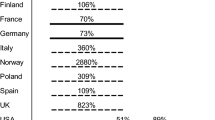Summary
Most economic theories of leisure are concerned with valuations of leisure time related to income as an opportunity cost. After a critical discussion of these theories, leisure time as a constraint is introduced in the theory of consumer behaviour by (1) distinguishing between ‘pleasant’ and ‘unpleasant’ consumer activities, (2) discussing the effects on individual's welfare of changes, in the duration of both types of activities and (3) developing time-saving concepts. A theoretical framework for consumer choices under time and/or income constraints leads to suggestions for the lines along which leisure research should be developed as a basis for welfare policy in the widest sense.
Similar content being viewed by others
Author information
Authors and Affiliations
Additional information
My thanks are due to Professors P. Hennipman, L. H. Klaassen, A. Pais and Mr. D. B. Needham for the valuable suggestions they made during the preparation of this article. Several parts of it will be presented in a more detailed form in a thesis on the subject.
Rights and permissions
About this article
Cite this article
Broekman, F. Economic theories of leisure: Some comments and suggestions. De Economist 126, 165–198 (1978). https://doi.org/10.1007/BF01770339
Issue Date:
DOI: https://doi.org/10.1007/BF01770339




